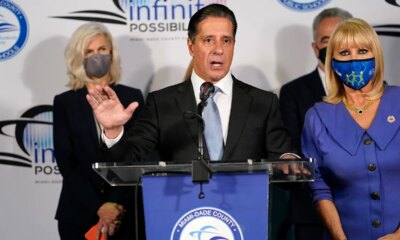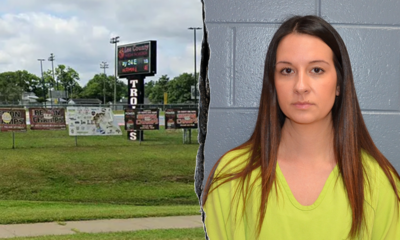Minnesota
New data shows teacher shortages in key subject areas across Minnesota

St. Paul Public Schools Bridge View School is the foundation for Pat Suyak’s career pivot.
The new teacher is helping fill a special education gap experienced statewide.
“To be able to give a voice to these kids, who don’t always have a voice, is just an incredible opportunity in my eyes,” said Suyak.
He explained he spent 15 years as a lawyer, primarily in a corporate setting, before experiencing burnout. Suyak left that profession and eventually joined Bridge View as a teaching assistant substitute. He became a summer school teacher this year and is now in his first year leading a special education high school classroom.
“It’s about taking care of people and taking care of these kids, and the motivation comes easy with that,” he said, getting choked up. “It’s wonderful.”
Special education is one of the areas with a teacher shortage statewide, according to data 5 EYEWITNESS NEWS obtained from the Minnesota Professional Educator Licensing and Standards Board.
It also shows, as of June, there were shortages of teachers in 44 license areas in the Twin Cities, which is higher than any other region.
The region that includes Chisago County, Isanti County, Kanabec County, Mille Lacs County and Pine County had the second-highest number, with 35 license shortage areas. In western Minnesota, the area of Big Stone County, Chippewa County, Lac qui Parle County, Swift County and Yellow Medicine County had the lowest number with 19 license shortage areas.
“The pools of teacher candidates are often low and in some cases, nonexistent,” said Deb Henton is the executive director of the Minnesota Association of School Administrators. “There just aren’t as many people interested in the positions in the classroom.”
The data shows shortages in key areas, including math, sciences, world languages and physical education in every region of the state.
“There are districts that have had to go to retired teachers, there are districts that have had to go to a contracted service,” said Henton. “In some of our areas of special education, there are simply not enough individuals going into the profession.”
Housing prices and affordability of child care are two factors that can be barriers to some young teachers pursuing the profession, according to Henton. She explained districts are working to attract teachers through hiring incentives and bonuses and expanding apprenticeships.
“We’re doing everything we can to attract quality teachers into the profession,” said Henton.
Joshua Taylor spent a year and a half as a special education teaching assistant at Bridge View School before stepping into a teacher role this year.
“I know that there’s a lot of need in that area,” said Taylor about his decision to focus on special education. “You just offer kids whatever you can at the end of the day.”
Taylor previously taught English abroad and has experience as a PCA. He decided to become a special education elementary teacher this year at the encouragement of other educators at the school.
The role has already proved rewarding just two weeks into the school year.
“Some kids require different supports, some kids require more of a need, everybody is just a kid,” said Taylor. “Some of the kids I’m seeing little growth, that is the best thing.”

Minnesota
Here’s how much snow parts of Minnesota got on Saturday, Feb. 28

Storm reports in from Minnesota on Saturday, Feb. 28.
LANESBORO, Minn. (FOX 9) – Impressive snow totals were reported in parts of Minnesota after a narrow band of heavy snowfall worked its way across the state.
Minnesota snow totals for the last day of February 2026
Snow totals for Saturday, Feb. 28, 2026. (FOX 9)
By the numbers:
Many areas saw more snow than was expected before temperatures warm up in the coming days.
The following snow totals were reported across Minnesota:
- Lanesboro: 10 inches
- Preston: 10 inches
- St. Peter: 7 inches
- Stewartville: 7 inches
- Caledonia: 6 inches
- Nicollet: 6 inches
- New Ulm: 5.5 inches
- Rochester: 4.9 inches
- Mankato: 4.5 inches
The Source: This story uses information from the FOX 9 weather forecast and the National Weather Service.
Minnesota
East Range Police Department officer passes away

A police officer in northern Minnesota unexpectedly passed away earlier this week.
The East Range Police Department said that Sgt. Cody Siebert passed away on Friday, less than 24 hours after being diagnosed with a brain infection.
The department said that Siebert was known for his happy-go-lucky personality and that “if you couldn’t get along with Cody, it was your fault.”
Siebert started at the K9 program in Babbitt with K9 Taconite (Tac) before going to the East Range Police Department.
“The hole left by Sgt. Siebert’s passing will be impossible to fill,” East Range police said. “We at ERPD love you and will miss you always. We have it from here.”
Mesabi East Schools also stated that the district was “truly blessed to have him walking our halls, greeting students, encouraging staff, and building relationships that went far beyond the badge.”
Click here for a GoFundMe to support Siebert’s family.
Minnesota
How ICE’s presence is affecting child care in Minnesota

-

 World4 days ago
World4 days agoExclusive: DeepSeek withholds latest AI model from US chipmakers including Nvidia, sources say
-

 Massachusetts4 days ago
Massachusetts4 days agoMother and daughter injured in Taunton house explosion
-

 Montana1 week ago
Montana1 week ago2026 MHSA Montana Wrestling State Championship Brackets And Results – FloWrestling
-

 Denver, CO4 days ago
Denver, CO4 days ago10 acres charred, 5 injured in Thornton grass fire, evacuation orders lifted
-

 Louisiana7 days ago
Louisiana7 days agoWildfire near Gum Swamp Road in Livingston Parish now under control; more than 200 acres burned
-

 Technology1 week ago
Technology1 week agoYouTube TV billing scam emails are hitting inboxes
-

 Politics1 week ago
Politics1 week agoOpenAI didn’t contact police despite employees flagging mass shooter’s concerning chatbot interactions: REPORT
-

 Technology1 week ago
Technology1 week agoStellantis is in a crisis of its own making

























